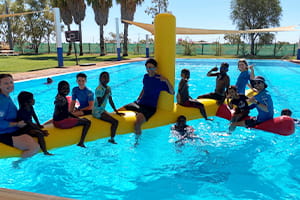Yandeyarra children enjoy Swim and Survive fun
For children in regional and remote areas of Western Australia swimming and water safety skills are vitally important, often though, due to a lack of instructors and facilities, they miss out on learning these skills. Thanks to our Remote Aboriginal Swimming Pool program the kids in Yandeyarra are among the lucky ones, with the pool ensuring the children have access to Swim and Survive education on a yearly basis during the pool season.
 Recently some of these children were able to enjoy learning some water safety skills and tips from a group of swimming teachers who travelled to the community from Port Hedland. With only six Cassia Primary School children attending the pool that day they were able to receive one-on-one attention from the instructors, and thoroughly enjoyed it!
Recently some of these children were able to enjoy learning some water safety skills and tips from a group of swimming teachers who travelled to the community from Port Hedland. With only six Cassia Primary School children attending the pool that day they were able to receive one-on-one attention from the instructors, and thoroughly enjoyed it!
One of the swimming teachers to take part in the trip was Maureen Lasisz, who was previously in the community 12 months ago, teaching a Swim and Survive program for Royal Life Saving, and the kids remembered her, welcoming her back with open arms!
Maureen says it was a very special day. “Having one child each for the session it was amazing to watch the interaction with the students and the young boys taking on some guidance from the two male instructors. From bombies, to basketball, swimming drills and lots of games, we then finished off with watermelon and pancakes for afternoon tea.”
The children have also been learning Swim and Survive skills with Yandeyarra Pool Manager Sandy McKenzie, and they were keen to show the visiting instructors all they had learned, so it was back in the pool for some show and tell following their afternoon tea!
Visiting a remote community as a swim instructor is a truly memorable and special experience and Maureen says that was certainly the case for this group. “I asked them what they thought of the experience and they all said it was the highlight of their time in the Pilbara. Thanks to all at Yandi for a great experience and yes we will be back to see you again!”
This visit was made possible through funding provided by Principal Community Partner BHP and the Department of Education’s inclusion program.